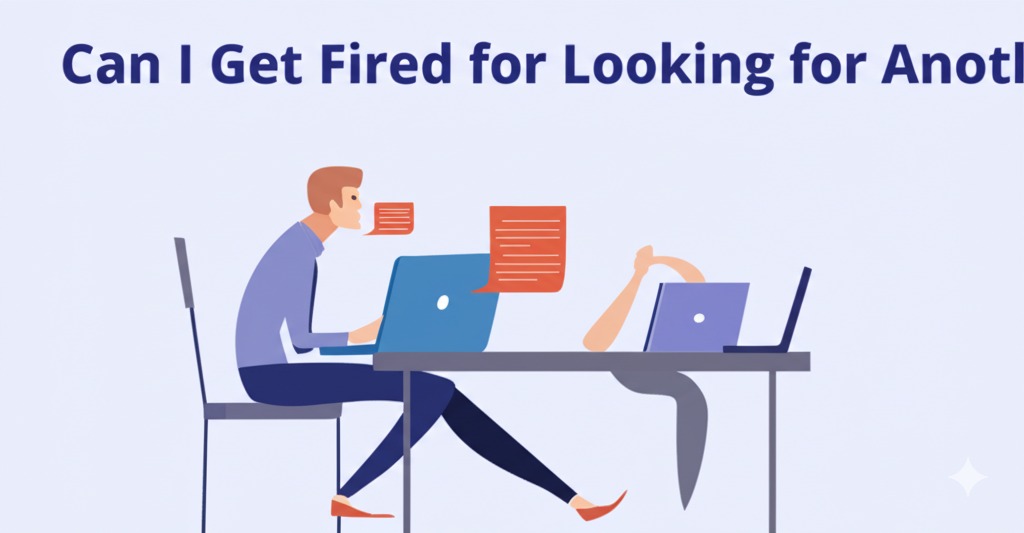
Job hunting while employed can be a tricky situation. You might be looking for new opportunities to grow in your career or find a role that better suits your skills and aspirations. But the question lingers: Can you get fired for looking for another job? This concern is especially relevant when you’re unsure about the policies of your current employer or the legal boundaries surrounding job searches. In this article, we’ll dive into the potential risks of searching for another job while employed and what you can do to navigate this situation without jeopardizing your current position.
Understanding the Risks: Can You Get Fired for Job Hunting?
Looking for another job while you’re still employed can certainly feel like walking a fine line. The primary question is whether your employer can legally fire you just for exploring other opportunities.
At-Will Employment and Its Impact
In many places, employment is considered “at-will,” meaning employers can terminate employees for almost any reason, as long as it doesn’t violate discrimination laws or breach a contract. So, can you be fired for looking for another job under at-will employment? Technically, yes. Your employer may decide that you’re no longer a good fit for the company or that your job search indicates a lack of commitment.
However, just because an employer can fire you doesn’t mean they will. In most cases, employees are let go for performance issues, not for seeking better opportunities.
Company Policies and Cultural Considerations
Every company has its own policies and culture regarding job hunting. Some employers may view job searching as a sign of dissatisfaction and choose to act on it, while others may have a more laid-back attitude, understanding that employees may seek career growth. For instance, some businesses may have a formal or informal rule against seeking another job during working hours or using company resources, like email or the internet, for personal job searches.
It’s important to know if your company has any explicit policies about searching for a new job while employed. Reading your employee handbook or reviewing your employment contract can provide clarity.
What to Do If You’re Looking for Another Job: Best Practices
If you’re actively looking for another job, it’s essential to proceed carefully to avoid causing tension with your current employer. Here are some best practices to consider when job hunting while employed:
1. Keep It Discreet
When you start looking for a new job, discretion is key. Avoid discussing your job search with colleagues or supervisors unless you feel confident that it won’t affect your current position. Sharing too much too soon could lead to an uncomfortable situation or, worse, prompt your employer to act on their suspicions.
2. Job Search During Off-Hours
Job hunting while you’re at work can raise suspicions, even if you’re simply updating your resume or applying to a few jobs. Avoid doing any job-search-related activities during company time. Instead, dedicate your evenings or weekends to researching opportunities or attending interviews.
3. Be Careful About Using Company Resources
You should also avoid using your work computer, email, or phone for job-related activities. Using company resources for personal matters, especially job hunting, can be seen as unprofessional or even unethical.
4. Focus on Professional Development
A great way to balance job hunting with your current role is to continue focusing on your professional development. Enhance your skills and grow your network so that any future opportunities you pursue align with your career goals. This approach ensures you’re constantly improving, regardless of whether you stay with your current employer or find a new one.
Legal Protections When Job Hunting
It’s important to know that there are legal protections in place for employees in many regions, so you might not be as vulnerable as you think when searching for a new job.
Anti-Retaliation Laws
In many countries, workers are protected from retaliation for engaging in activities like job hunting. For example, if you’re looking for a job because of a hostile work environment, discrimination, or unethical practices, anti-retaliation laws protect you from being fired or facing other punitive actions for seeking a better opportunity.
Contracts and Non-Compete Clauses
If you have a non-compete clause in your contract, things can get trickier. These clauses often restrict you from working with direct competitors for a certain period after leaving a job. Make sure you fully understand any contracts you’ve signed, as violating these clauses can lead to legal consequences.
Unemployment and Job Search Protections
In some regions, if you are fired for reasons unrelated to job performance (such as your job search), you may still be eligible for unemployment benefits. However, this varies by location and specific circumstances, so it’s wise to check local labor laws to understand your rights.
How to Handle an Employer’s Reaction to Your Job Search
If your employer finds out you’re job hunting, how you handle the situation can greatly influence the outcome.
1. Be Honest and Professional
If your employer confronts you, maintain a professional attitude. Be honest but tactful about why you’re looking for a new job. Whether it’s for better growth opportunities or a change in career direction, presenting your reasons thoughtfully can go a long way in maintaining respect and understanding.
2. Stay Focused on Your Work
Regardless of your job search, continue performing well in your current role. Show your employer that even if you’re exploring new opportunities, you are still dedicated and effective in your current position.
3. Leave on Good Terms
If you do end up leaving your job for a new opportunity, strive to leave on good terms. A positive exit—such as giving appropriate notice and offering to help during the transition—ensures that you maintain your professional reputation, which can benefit your career down the road.
Conclusion: Should You Risk Job Hunting While Employed?
Looking for another job while employed can be nerve-wracking, but it’s not necessarily a fireable offense. While employers may have the right to terminate at-will employees, most employers understand that employees may seek new opportunities. As long as you conduct your job search discreetly and professionally, your current role is unlikely to be affected. Just make sure you understand your company’s policies, your legal rights, and handle the situation with care.
If you’re feeling uncertain, consider discussing your options with a trusted colleague or a career counselor. Seeking new opportunities doesn’t have to put your current position at risk if you approach the process thoughtfully.

Andre Cuevas provides career insights, job search strategies, and professional advice to help individuals navigate the job market and achieve their career goals.





